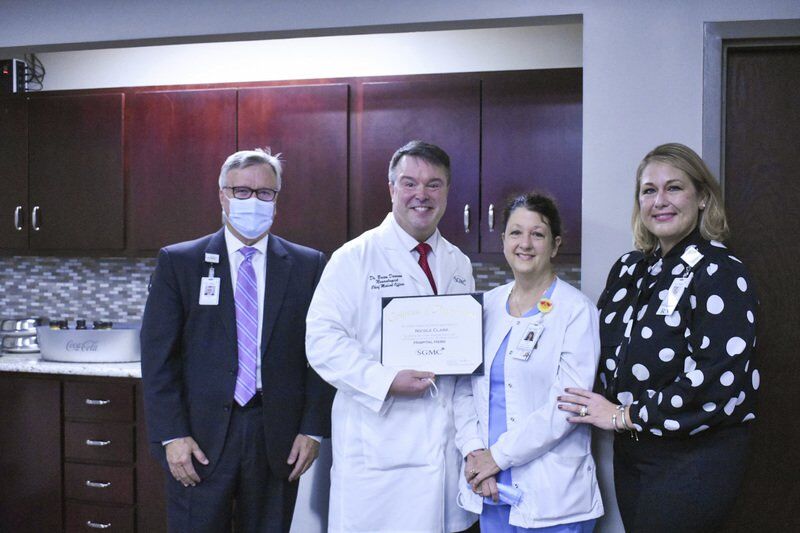Antibody process changes affected SGMC supply
Published 7:54 am Tuesday, September 28, 2021

- Bryce Ethridge | The Valdosta Daily TimesHospital social worker Nicole Clark, center right, was honored as Hospital Hero for her diligence in her work and efforts to help outside of it. She stands with hospital CEO Ronald Dean, Chief Medical Officer Dr. Brian Dawson and Jennifer Smith, case management director.
VALDOSTA – A change in the supply process caused the recent shortage of the monoclonal antibody supply at South Georgia Medical Center.
Brian Dawson, hospital chief medical officer, explained the process to the Hospital Authority of Valdosta-Lowndes County members, saying, formerly, the U.S. Department of Health and Human Services received the monoclonal antibodies from AmerisourceBergen, a wholesale company, that distributed them to hospitals.
HHS bought limited supplies of the antibodies, leading to an unequal distribution of them to hospitals across America.
So, HHS gave allocation duties to state governments, relying on its regional utilization analysis reports to supply hospitals with the antibodies as needed.
Dawson said SGMC staff knew it wouldn’t be getting any more monoclonal antibodies but decided to continue using the hospital’s supply.
“It doesn’t do any good sitting on the shelf,” Dawson said. “We wanted to make sure we got it into as many people as we could as quickly as we could.”
Supplies dwindled to the point SGMC only gave the monoclonal antibodies to people needing it in the emergency department. It led to the shutdown of the infusion center, but as of 3 p.m., Sept. 22, operations resumed in the infusion center.
Dawson said staff will evaluate the supply on a day-to-day basis.
Ronald Dean, hospital chief executive officer, celebrated the gradual decrease of SGMC’s COVID-19 infected patients during the Hospital Authority meeting.
SGMC had 53 infected patients at the time of the meeting and had dropped to under 50 early this week. The hospital had as many as 118 virus patients in its care only a few weeks ago, Dean said.
Dawson said the hospital is seeing fewer patients affected by the delta variant of COVID-19 but added the surge was a pandemic of the unvaccinated.
He said data shows 100% of patients on ventilators were unvaccinated for most of September at SGMC.
Data reported earlier this month showed 93% of SGMC virus patients infected with COVID-19 were unvaccinated.
“Vaccinations are the primary strategy for people to be able to resist this disease in addition to social distancing, masking, washing your hands and covering your cough,” Dawson said.
He said SGMC will continue promoting vaccinations throughout its health system. This week, the hospital has administered more than 42,000-plus vaccinations.
Dawson told the Hospital Authority that Pfizer, one of the vaccine companies, performed a study testing the vaccine on children younger than 12 years old.
The study took a group of children between ages 5-11, Dawson said, who were given a third of the adult dose of the vaccine. He said they found the measurement to be safe and effective in producing an antibody response.
Pfizer is submitting the report to the U.S. Food and Drug Administration for more testing and future approval.
SGMC introduced seven new doctors: Dr. Eric Thomas, podiatry; Dr. Austin Sorchik, family medicine; Dr. Swapna Narayana, hematology/oncology; Dr. Luke Seibolt, interventional cardiology; Dr. Robert Kirtley, interventional physiatry; and Dr. Rita Medina, infectious disease.
Dawson said the doctors are a response to the growing health needs in the community and one that makes sure the hospital continues covering all of its bases.
Johnny Ball, hospital vice president of marketing and affairs, said the hospital is proud to bring the doctors on staff given the stress the pandemic has put on the community.
“Hopefully, it’s something that will help with patients being able to see their doctor in a timely manner and not have to go out of town,” Ball said.
SGMC wants to continue the push for bringing in “good, qualified” doctors to its health care network, they said.
Three Hospital Authority positions were up for vote — chairman (Sam Allen), vice chairman (Dr. John Roan) and treasurer (John W. Langdale, Jr.) — all of whom were reelected.
Nicole Clark, a social worker with SGMC for 22 years, was honored as Hospital Hero.
She was honored for her diligence as a social worker but Dawson highlighted her efforts to help others outside of work.
Clark worked with her husband to acquire slightly used equipment (such as walkers, canes, etc.) from thrift shops to give to patients who needed it but couldn’t afford it.
“It really reflects the kind of people we have to work with in this organization,” Dawson said. “Even when they walk away from this facility, they still embody those ideas that we believe in here.”




